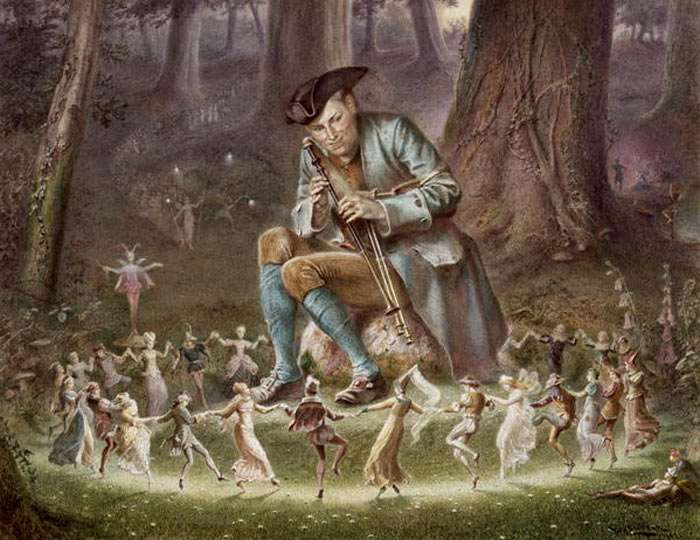
back to House of the Sun index

This article is also available in PDF format.
|
As with other elementals, the air elementals are of various degrees of evolution. The lower levels are usually called fairies. They can be very small and have little consciousness. They are associated with plants and flowers, and these are what most people are familiar with. The more evolved ones are larger and take on a more human appearance. Those in charge of air currents and the atmosphere are mostly known as sylphs. The most evolved ones are in charge of large weather patterns. Encounters or contacts with sylphs are much rarer than with gnomes and mermaids. Sylphs are usually contacted by magicians, or a few gifted psychic people who are tuned into nature. In general, sylphs are not that interested in humans, but there are exceptions. |
|
Contents: |
|
The smaller air elementals, called fairies, are busy with the growth and health of plants. They have little awareness and are mainly occupied with their tasks. They can sometimes be seen dancing in circles, as was witnessed by the occultist and psychic Geoffrey Hodson (1886-1983), an English theosophist, who could look into the elemental realms and observe various elemental beings. According to his observations, "fairies and sylphs generally appear to clairvoyant vision much as represented in fairy-tales. They look like beautiful maidens with brightly colored wings, not used for flight since these beings float swiftly or slowly at will, their rosy, glowing forms partly concealed by gossamer, force-built “garments”." In his book Kingdom of the Gods he writes: "A bright radiance suddenly shines out over the field, some sixty yards away. It is due to the arrival of a group of fairies under the control of a superior fairy, who is autocratic and definite in her orders, holding unquestioned command. They spread themselves out into a gradually widening circle around her, and as they do so a soft glow shines over the grass. Since they swung high over the tree tops and down into the field, the circle has spread to approximately twelve feet in width. Each member of this fairy band is connected by a stream of light with the directing fairy, who is in the centre and slightly above them. These streams are of different shades of yellow, deepening to orange; they meet in the centre, merging in her aura, and there is a constant flow backwards and forwards along them. The form produced by this is something like an inverted opalescent, glass fruit dish, with the central fairy as the stem and the lines of light, which flow in graceful, even curves, forming the sides of the bowl. The impression was received, that the interchanges and the complex designs produced by the dance which followed stimulated, and provided a model for, the development of forms in the plant kingdom of Nature in the neighbourhood." |
 Fairy Dance, a painting by William R. "Bill" Sullivan (1942–2010) |
The Fays or White WomenThe dancing is also found with the larger, more evolved air spirits, sometimes called the tall blond fairies, fays, or with an older term, the white women. In folktales, there are stories of these white women dancing on music. The are so enchanting that the beholder can't resist their invitation to dance with them. He then dances to exhaustion, because the white women never get tired of dancing. They are not only beautiful to behold but their music and dancing brings the person into an all-encompassing ecstasy. Sometimes they disappear all at once, or the person breaks the spell and runs home. As with other elementals, of earth and water, time passes different in their realm, and one night of dancing might equal several days or months in our world. |
|
Oberon, Titania, and Puck with Fairies Dancing, a painting by William Blake |
|
More evolved air spirits are called sylphs. They travel through the air, surfing winds, air currents, and shaping weather patterns. They have characteristics of what we humans call the mind. The mind, in Buddhist terms, is often compared to the sky, open and expansive. Like winds and clouds, thought come and go, but the mind can be quieted to a profound stillness, and then it resembles an infinite still, expansive sky. Sylphs, when interested, relate well to people whose mind have been disciplined through meditation. Sylphs also relate to artists like musicians and poets, as music and poetry flows like the wind. The connection between air and music is well-known. Jean-Paul Richter (1847–1937), a German art historian, said "Music is the poetry of the air." Sir Edward William Elgar (1857-1934), an English composer: "My idea is that there is music in the air, music all around us; the world is full of it, and you simply take as much as you require." |
|
Geoffrey Hodson (1886-1983) an English theosophist, who could look into the elemental realms and observe various elemental beings. Sylphs are very fluidic and fast moving, flowing through the atmosphere with ease. Geoffrey Hodson expressed this clearly in his book Kingdom of the Faerie, in which he gives a description of sylphs observed at Coneyhurst Hill, Hurtwood, near Ewhurst, in 1926: "We are sitting at the edge of a wood consisting of the very old larch and pine trees which cover this sandstone hill; from the southern slopes we are able to see a wide panorama of beautiful countryside, which stretches away to the South Downs. An atmosphere of spontaneous joyousness and gaiety pervades all the activities of the various members of the deva evolution, who are to be found in this neighbourhood. There is a strong south-westerly wind, in which sylphs are to be seen disporting themselves; their gambols consist of long, swift, straight rides down the wind for miles and miles until they are lost in the distance; or of twists, turns and sudden upward dartings, followed by breathless dives, which cease abruptly just above the treetops, and are again followed by an equally swift ascent thousands of feet into the air. Here and there, groups combine in a wild aerial dance, with their auras streaming out behind them as if blown by the wind, their eyes wild with excitement; intoxicated with joy, they swing in great circles, suddenly formed, and as suddenly broken, exulting in the power and vital energy with which their aerial home is charged on this wonderful morning of spring. Under these conditions they frequently lose all semblance of human form, seeming to become whirling masses of force and vital energy, in which suddenly appear graceful wing-like formations, long streaming curves, a suggestion of waving arms, and of hair flying in the wind; ever and anon two blazing eyes appear, and a face of unearthly beauty, combining in its expression in a way utterly impossible to human kind, exaltation, intoxicating ecstasy, and a fierce virility and power. Just now one paused, hovering so near that he appeared to fill the heavens with his brilliant aura and to dominate the whole field of vision with his dynamic presence; in a flash he was gone, disappearing in the remote distance, covering leagues and leagues of the "wide savannahs of the blue" in a second of time; he seemed driven by an energy and charged with a power over which he himself had but partial control, as if he had drunk so deeply of aerial vitality -of the power of the wind which sweeps down the Weald, setting the firs a-sighing with that long, sweeping song of their kind, which is so strangely like the distant roar of the sea- that he was unable to maintain a stationary position. Contact with the consciousness of the sylph in this condition suggests to me a state of concentrated energy similar to that found within the atom; it produces the feeling of compression, almost to bursting point, of incalculable energy, awe-inspiring in its potency, yet harmless because confined to prescribed channels of flow. I am almost oppressed by the contrast between this vivid existence and our human life in the flesh, which appears to be so dull and limited within these heavy, unresponsive human forms. Even at the mental level I, for one, would stand no chance in a race with a sylph, for whilst I was making up my mind to start, he would have reached the winning-post. The very matter of his body is alive and instinct with energy and motion; it would seem that, whilst to us willpower must be exerted in order to move, with such an one as him, who has just filled and flooded the atmosphere about us with his vivid presence, the opposite is true, for it seemed almost impossible for him to remain still." |
|
A sylph as seen by Geoffrey Hodson as moving over the seas |
A mountain sylph |
|
An important quality of sylphs is freedom, as air likes to move freely around the planet and around all obstacles. Sylphs love freedom, and that is why there is so little contact with humans who like to control everything. Some magicians put a binding spell over elemental beings in order to control them for their own selfish purposes. A nightmare for sylphs. With mermaids, it is well-known that they can enter the human realm in order to pursue a love relationship with a human. As many of these tales show, such a relationship doesn't last long. Over time, the mermaid longs to be back in her own element, water. A man can also be so enchanted with a mermaid that it leads to his own death, by drowning. With the sylphs we find a similar attraction and problems when sylphs get interested in humans. Geoffrey Hodson makes this clear in his The kingdom of the Gods: "Certain nature spirits on the threshold of individualisation into angelhood, particularly those associated with the element of air —fairies and sylphs— can feel attracted towards men who possess the power consciously to enter their kingdom and communicate with them. Their submission to this attraction is rarely complete, and even whilst seeking to allure the object of their affections, they do not usually conceive a permanent relationship. Such close mento-emotional associations with human beings can be helpful to them even though very harmful to their human partner. For them, the attainment of individualisation might be hastened by a blending of their mento-emotional nature with that of an individualised human being, but for man the adventure would be likely to lead to insanity. Medieval legends in which sylphs and other nature spirits for their own advantage seek, and even physically attain, unions with men are probably more allegorical than historical. Physical union would demand materialisation on the part of the sylph which is most unlikely and, if ever attained, very rare. It would seem to be more probable that a veiled reference is being made to the evolutionary value to such nature spirits of close psychical association and collaboration with members of the human family. An occult tradition does exist that, as an exception to that impersonality which is characteristic of highly evolved devas, intimate egoic attachments with human beings have been formed and have even become so strong as to cause the deva to seek and obtain admission to the human kingdom in order to be near the beloved human being. Birth in a human body then follows and, when a physical meeting with the beloved occurs, a very deep and fiery love is awakened in both of them. So strong is this emotion, that, if conventional barriers exist, they are ignored. Tragedy is not infrequently the result." |

Air Spirits by Letecia Pheiffer
|
Because sylphs love music and harmony, and they move freely through the air, they can cover vast distances, and feel every nuance in the weather patterns. They like to harmonize and balance not only the weather, but also the different energies coming from the cosmos and the earth, and disperse the accumulation of negative human created energies. For this purpose they can easily make change in air pressure and conjure up storms. Geoffrey Hodson watched the sylphs of an approaching storm. Although Hodson describes them as unpleasant to look at, take into account that storms and the sylphs associated with them, have their place in nature. These storm sylphs merely embody the storm energies: "While I watched from the slopes of Helvellyn the approach of dark masses of stormcloud, I observed a number of birdlike air spirits travelling in front of the oncoming clouds. Many of these sylphs are dark and fearsome to look upon, being slightly suggestive of large, swiftly swooping bats. They are darting backwards and forwards across the Wythburn valley, sometimes following quite closely the conformation of the hills. They appear to be in a condition of high excitement and give the impression that they are intensifying the electric and magnetic conditions characteristic of a storm. Their faces are human and fully formed, though their expression is distinctly unpleasant. There are large numbers of them —probably a hundred— including some whiter varieties of sylph. They utter a weird, shrieking noise and occasionally shoot vertically upwards, passing into the clouds and reappearing above them." |
|
In the elemental world, there is also evolution among its inhabitants. In each element a spirit starts out as tiny beings and with little awareness and consciousness, primarily engaged in the limited task it is assigned to. Over time these beings learn and expand their consciousness, raising themselves in rank, take on more important tasks, and this also reflect in their appearance when viewed by humans. Flower Arlene Newhouse (1909–1994) was an American Christian mystic and spiritual teacher. In her book The Kingdom of the Shining Ones she goes into detail of the different kinds of elemental beings, and she gives names to the different ranks. I found those of the air spirits especially interesting, so I am giving you here an overview from that chapter. The first order corresponds with what we have called the fairies in this article: "The Air Kingdom infant is an elemental extremely minute in size. In current teachings these beings are sometimes called Builders. In the inner plane schools they are often referred to as the Wee Ones. They are of such minute size and development that they cannot be adequately used by Higher Intelligences at their present stage of enfoldment. Builders are comparable in the Air World to Oceanids in the Water Kingdom. These Wee Ones are resplendent in color and beauty, and are fond of moving among the flowers, shrubs and nearly among all of the vegetable life. The larger the plant, the more of these beings will be attracted, for they are similar to bees in that they are led by instinct to move in their etheric forms about and through the leaves, stems and blossoms of this beautiful nature world. They, too, know a division of sex. Their lives extend over a period of about ten years in earth's time measurement. They realize repeated lives of growth in rapid succession. Hardly is one body completed than another more lovely in color and form is prepared for them. The imaginary accounts given in children's books concerning fairies deal with these beings who are really much smaller in size than human beings have realized. After experiencing no less, though ofttimes more, than sixty changes in bodies in this kingdom, they advance to the next stage of their evolvement. They move and are governed by instinct. They scarcely understand what they do or why, and yet their movement and their enjoyment and joyousness of life serves a purpose in the respiratory system of the Nature Kingdom." The next order might corresponds with what is known as fays or white women, but they might just be a part of what Newhouse calls Zephyrs: "The next youngest life in the Air Kingdom is
known as the Zephyr. This being contains active intelligence. It
achieves a height of no less than three feet when mature, while
possessing a beauty which is seldom paralleled on earth. A Zephyr is
brought into being by the joyful, playful or adoring ecstasies of its
parents. There is a bounty of spirits in this world as in all of the
other kingdoms we are considering in this volume. Zephyrs together
create and produce their offspring—it is not the work alone of the
mother. Labor toward this creation takes place outside of any Devic
body. Its formation resembles the developing of an egg more than the
type of human conception known in our kingdom. In a period of ecstatic
communion with the Superior Intelligences of the vast Air World, the
egg-like form, which the parents created, breaks and a small but
beautiful being emerges—a being less than a foot tall, but a replica in
every other way of its parental creators. A Zephyr will attain the same
height and enfoldment its parents have realized, both in stature and in
mentality, within three hundred to five hundred earth years.
Individuality is strongly apparent in this kingdom. Next we have the Sylphs: "We now consider the Sylphs who are older, wiser and more developed citizens of the kingdom. Were you to behold this form of life, a Sylph would appear to be swimming in the atmosphere because of the nature of its life and service. Sylphs are Air Devas whose bodies, when upright, greatly resemble human beings in stature. Their bodies average from three to five feet in height. Like all of Deva origin in this world, their etheric, or lowest body, realizes an existence of at least five hundred years. Sylphs, though not Angels as yet, possess a wondrous degree of mentality. They are far more intuitional than most of the Masters' pupils on earth, and their receptivity to Superiors is instantaneous and wholehearted. Into the etheric envelop of earth's atmosphere come literally hundreds of rays, mostly of solar origin—although there are a little less than forty specific cosmic rays which penetrate our atmosphere. Sylphs work with etheric conditions created by solar and cosmic forces. They are unable to prevent the inner accumulated radiations of these beams, but they are possessed of that ability which enables them to create wide and appropriate inner canopies of sufficient size which act as screens through which these rays penetrate less forcefully. Depending upon the need of a tree, a hillside, a mountain, or a community, the Sylphs give their individual or group labor toward the building of numerous beautiful screens made of their own etheric substances. The existence of these screens is determined by the De-vas' own recognition of the length of time such rays will., be active in the locality. It is through their work that certain hills and mountains possess or lack prang and the ozone force of the tincting radiation. Those places which possess the peculiar elements just mentioned are receiving greater degrees of radiation of solar and cosmic forces." The next order she calls "Angels of the Winds of Nature." In the higher worlds they are called Cilarae (kih LAIR eye): "This particular Angel Order of the Air has
charge of all the steadfast air currents which are caused by earth's
rotation. These include prevailing westerly winds as well as the
equatorial winds and others which are familiarly known in their own
localities. Since air currents are in constant motion, they are like
rivers of air. Cilarae are Sentinels—steadfast watchers of these
unceasing streams. Some prefer to have charge of the westerly trade
winds—others of this Host are more drawn to the tremendous power present
at the equatorial belt. There are several groups of air spirits who have specific tasks in relation to specific climatic or weather conditions: "Devas of Lightning" (and the Angels of this
Order) are under Planetary Intelligences who regard the needs of the
world from several levels. If the earth is in need of certain elements,
or the etheric or lower astral planes are heavy with impurities,
lightning will be attracted. The term, "Electric Angels," is often given
to the group which deals with magnetism and the forces of electricity.
In the Deva World they are called Speeriel (SPEARee el). When humanity's
consciousness is more uniformly developed, men shall receive knowledge
directly from this order for the harnessing and control of this powerful
element. "In the stratosphere of earth, and commonly about all similar planets, are the highest and the most developed Intelligences of the Air Kingdom. Their islands of air are immense; and their sanctuaries where infinite peace exists are beyond human comprehension. In this locality dwell the Tija (TEE jah). They are tremendously advanced, Masterly and Lordly Figures representative of the gentler as well as the stronger sex. All instruction, all decision as to changes regarding climate, rainfall and the fertility of earth are considered in this threshold by the Tija. Some of their rank belong to the Water Kingdom. Most of their numbers are above the level of Archangelhood." |

|
Man's Disrespect towards Nature As with the spirits of the other elements, the issue of man's disrespect towards nature always comes up. Flower Arlene Newhouse explains that the Cilarae Angels we just mentioned: "... are in charge of the younger orders given into their care, including the Zephyrs and Sylphs. However, in times of storms the younger beings are sent out of the disturbed territories for only Advanced Angels remain during serious storms. Havocs are created on earth by men's low-grade feelings and thoughts which precipitate their cruelties and perversions. Violent forces are inclined to gravitate toward vicinities which best anchor them. Such etheric negative energies, over a period of time, grow to such large proportions and contain such eruptive, brewing violence that it is imperative to allow their dissipation. Thus, in earth's typhoons and hurricanes, a necessary dispersion of etheric destructive elements takes place... Whenever a catastrophe occurs on the physical
plane, whether it is an earthquake, cyclonic storm or similar violent
disturbance, it is due to the fact that Nature Intelligences—who are
answerable to either earth, air, fire or water elements—have been
offended by the sacrilege of irreverent human beings. Theirs is not an
attitude of punishment or retaliation, for they do not cause these
disruptions. They simply permit areas to be inwardly cleansed of the
powers that have gathered so that the whole planet itself will not be
destroyed. This would happen were the monstrous forms allowed to
accumulate and increase unimpeded without adequate dissipation through
releasement. If, in a certain area, danger of earthquake threatens, its
human citizens should together purify themselves of selfishness,
deceitfulness and hatreds especially. Hurricanes, from the inner
causative standpoint, are believed to be the result of the tempers,
prejudices and greed energies of vast sections of people on the physical
globe. |

Painting by Albert Bierstadt (1830-1902)